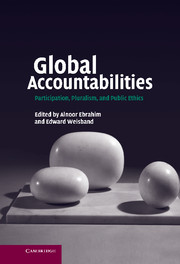Book contents
- Frontmatter
- Contents
- List of tables
- List of figures
- Acknowledgments
- List of contributors
- 1 Introduction: forging global accountabilities
- Part I Public accountability: participatory spheres from global to local
- 2 Multilateralism and building stronger international institutions
- 3 Global financial governance and the problem of accountability: the role of the public sphere
- 4 Citizen activism and public accountability: lessons from case studies in India
- Part II Experiments in forging NGO accountability: mutuality and context
- Part III Reflective accountability: new directions for participatory practices
- Part IV Global accountability frameworks and corporate social responsibility
- Index
- References
4 - Citizen activism and public accountability: lessons from case studies in India
Published online by Cambridge University Press: 22 September 2009
- Frontmatter
- Contents
- List of tables
- List of figures
- Acknowledgments
- List of contributors
- 1 Introduction: forging global accountabilities
- Part I Public accountability: participatory spheres from global to local
- 2 Multilateralism and building stronger international institutions
- 3 Global financial governance and the problem of accountability: the role of the public sphere
- 4 Citizen activism and public accountability: lessons from case studies in India
- Part II Experiments in forging NGO accountability: mutuality and context
- Part III Reflective accountability: new directions for participatory practices
- Part IV Global accountability frameworks and corporate social responsibility
- Index
- References
Summary
A central problem of accountability in public institutions is how to structure citizen participation so that it is meaningful, rather than token, and so that it extends beyond the exercise of “voice” and towards concrete influence over decision-making and enforcement. Both of the preceding chapters in this book closed with an invocation for greater participation. Woods pointed to the need for people in developing countries to have more influence in setting development priorities, and Germain suggested that a key challenge for institutions of financial governance in the twenty-first century will be to operationalize participation in order to achieve “genuine” accountability.
This chapter begins to address this challenge by presenting two cases of citizen activism in India where notable gains in public accountability through participation have been achieved. These are municipal and state-level experiences, and thus cannot easily be translated into implications for global institutions for reasons already elaborated in this volume. However, if accountability is to be built from the bottom up, these cases provide an empirical opening.
Introduction
Aid and development organizations have in recent years funded a large number of anti-corruption commissions, auditors-general, human rights machineries, legislative public-accounts committees, and sectoral regulatory agencies in developing countries. They are institutions of “horizontal accountability” – state agencies that monitor other organs of the state. Their reform has been a central concern of contemporary “good governance” policies.
- Type
- Chapter
- Information
- Global AccountabilitiesParticipation, Pluralism, and Public Ethics, pp. 65 - 86Publisher: Cambridge University PressPrint publication year: 2007
References
- 4
- Cited by



